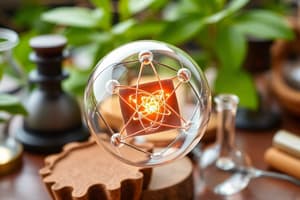Podcast
Questions and Answers
What is the primary focus of natural sciences?
What is the primary focus of natural sciences?
- Study of abstract concepts
- Study of physical world (correct)
- Study of human society
- Study of numerical patterns
Which of the following best describes the scientific method step of 'hypothesis'?
Which of the following best describes the scientific method step of 'hypothesis'?
- Gathering data and noticing phenomena
- Formulating a testable prediction (correct)
- Conducting experiments to test a prediction
- Interpreting data and results
What distinguishes applied sciences from other branches of science?
What distinguishes applied sciences from other branches of science?
- They use scientific knowledge for practical applications. (correct)
- They study living organisms.
- They analyze numerical patterns.
- They focus exclusively on abstract reasoning.
What is a key characteristic of a scientific theory?
What is a key characteristic of a scientific theory?
Which branch of science focuses on human behavior and societies?
Which branch of science focuses on human behavior and societies?
Flashcards are hidden until you start studying
Study Notes
Definition of Science
- Systematic study of the natural world.
- Based on observation, experimentation, and evidence.
Branches of Science
-
Natural Sciences
- Focus on the physical world.
- Includes:
- Physics: Study of matter and energy.
- Chemistry: Study of substances and their interactions.
- Biology: Study of living organisms.
-
Formal Sciences
- Study of abstract concepts.
- Includes:
- Mathematics: Study of numbers and patterns.
- Logic: Principles of valid reasoning.
-
Social Sciences
- Study of human behavior and societies.
- Includes:
- Psychology: Study of the mind and behavior.
- Sociology: Study of social behavior and institutions.
-
Applied Sciences
- Use of scientific knowledge for practical applications.
- Includes:
- Engineering: Design and construction of structures and systems.
- Medicine: Study and practice of health and healing.
Scientific Method
- Observation: Gathering data and noticing phenomena.
- Hypothesis: Formulating a testable prediction.
- Experimentation: Conducting experiments to test hypotheses.
- Analysis: Interpreting data and results.
- Conclusion: Determining whether hypotheses are supported or refuted.
Key Concepts
- Theory: A well-substantiated explanation of an aspect of the natural world.
- Law: A statement based on repeated experimental observations that describe some aspect of the universe.
- Data: Information collected during observations and experiments.
Importance of Science
- Advances technology and medicine.
- Informs public policy and environmental conservation.
- Enhances understanding of the universe and our place in it.
- Promotes critical thinking and problem-solving skills.
Definition of Science
- Systematic study aimed at understanding the natural world through observation, experimentation, and evidence.
Branches of Science
-
Natural Sciences: Investigate the physical universe.
- Physics: Explores matter and energy interactions.
- Chemistry: Examines substances and their chemical interactions.
- Biology: Studies living organisms and their processes.
-
Formal Sciences: Delve into abstract concepts.
- Mathematics: Focuses on numbers, patterns, and relationships.
- Logic: Establishes principles for valid reasoning.
-
Social Sciences: Analyze human behavior and societal structures.
- Psychology: Investigates the mind and behavioral patterns.
- Sociology: Examines social interactions and institutions.
-
Applied Sciences: Utilize scientific principles for real-world applications.
- Engineering: Involves the design and construction of tools and structures.
- Medicine: Focuses on health, healing, and the treatment of illnesses.
Scientific Method
- Observation: Collecting data and identifying phenomena.
- Hypothesis: Creating a testable prediction or explanation.
- Experimentation: Performing experiments to test the hypothesis.
- Analysis: Examining and interpreting the data gathered.
- Conclusion: Deciding if the hypothesis is supported or disproven by the results.
Key Concepts
- Theory: A robust explanation of natural phenomena based on extensive evidence.
- Law: A generalization derived from consistent experimental findings, describing universal properties.
- Data: Information acquired through observations and experiments essential for analysis.
Importance of Science
- Drives advancements in technology and medicine, improving quality of life.
- Shapes public policy and supports environmental conservation efforts.
- Deepens our comprehension of the universe and humanity’s role within it.
- Cultivates critical thinking and problem-solving abilities in individuals.
Studying That Suits You
Use AI to generate personalized quizzes and flashcards to suit your learning preferences.




